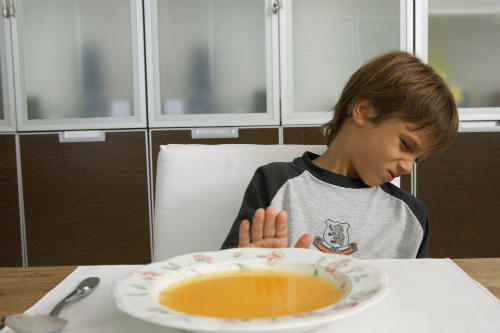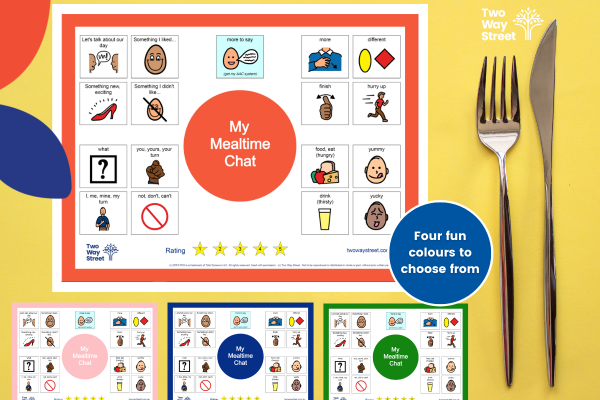
Managing mealtimes (and the meltdowns that come with it)
We all know the theory on the importance of family mealtimes. They should be a time free from screens and an opportunity for the entire family to spend time together talking about their day and common points of interest. However, in most families this is an idyllic scenario that despite every good intention never quite materialises. At Kids on Track we hear a lot about mealtimes being disrupted due to fussy eaters, children not wanting to sit next to one another, children not being able to sit for long periods of time or simply everyone being on different schedules.
Add into the mix a child/ren in the family with a disability who may take longer to process, could have sensory issues or may experience anxiety about sitting at the table and the beautiful image of mealtime bliss can disappear into a meltdown very quickly!
Here we give you 5 strategies to help manage the most common problems that occur.
MANAGING YOUR CHILD/REN’S ANXIETY
As strange as it sounds, sitting down to eat whether at home or at a restaurant can actually be a very stressful experience for your child. They can be made to feel out of control that they don’t know what is expected of them in the environment especially if family mealtimes together don’t happen that often. It can be helpful to have a visual mealtime schedule which either goes through the expectations such as sitting on chairs or listening to one another, or goes through each step including eating, talking and leaving the table so they are aware of what is coming next. Another tip is to allow your child to have downtime doing something which relaxes them immediately prior to a mealtime, this can include screen time, especially if you want to ban screens from the table.
If you are going out to eat and therefore your child won’t know what food they will get there, think about showing them the menu and letting them choose a couple of options. (Tip – have a second choice in case what they want isn’t available that day)! As a back up when you are out (even if just at a friend’s house), it is worth having some snacks with you that you know your child will eat in case they don’t want to play ball once you get to the meal! If they know that there is a back up plan, this can help to calm them.
BEING AWARE OF SENSORY TRIGGERS
Many of us ( even those with no diagnosed issues) like food to be just so. It may be just the right consistency or right amount of flavouring but without it, it just tastes wrong. With children who have sensory issues, mealtimes can be very unpredictable! Something not mixed exactly right, the noise of a sibling’s chewing, the smell of a food that isn’t near them but is on the table. It seems that any little thing can cause a HUGE meltdown and after that dinner for the whole family is ruined. For anyone who has experienced a sensory meltdown, you know how tricky they can be. However, in time they can be avoided.
The first step is to be aware of the fact that mealtimes can be a sensory trigger for all of us even those with no issues at all!
Secondly, if you are finding that your child (diagnosed or not) is having meltdowns around food, try to take note of the patterns. What was the food? What else was on the table? What was the positioning of the rest of the family? Where were you? How were they sitting? Once you have this information, you can start to form a picture of what your child is able to tolerate.
Thirdly, you have to decide how much you want the particular child at the table at that time. If you do, they need to be allowed to eat what they want, sit where they want and dictate to a certain extent what is happening at the table.
STRUCTURE AND CONSISTENCY AROUND MEALTIMES
Lots of families have set seats at the table and that is one example of creating a set structure around eating. Other consistencies can be allowing kids their own mats or special plates and sometimes simply allowing them to eat the same thing for a certain meal. One idea can be to create a weekly menu so they know for example that every Monday is pizza, Tuesday is spag bol and so on. It could also be that if you don’t sit as a family every night, there is a visual schedule of who is home for dinner on what night. For children who thrive on this type of structure, going out for meals or having guests can be very unsettling so you will need to prepare them in advance.
FOCUS ON SOMETHING OTHER THAN THE FOOD
Some children have no problem snacking on their own throughout the day but family dinners they just can’t deal with. It is worth trying to engage your child in parts of the meal that aren’t to do with the eating. Get them to help set the table or let them suggest a game to play as a family. Whilst of course it is important that your child is eating enough, it is also unlikely that they are starving if they ate their lunch at school or don’t touch the meat but eat the fruit for dessert. There is something to be gained simply by the experience of spending this time as a family (or part of a family). Whilst mealtime is a vehicle for this, if the focus becomes about who has eaten what, it is a stressful experience for everyone concerned! If your child doesn’t want to sit at the table, try offering them a reward simply for sitting for an agreed amount of time, even if they don’t eat anything.
PICK YOUR BATTLES
Never is this adage truer than when it comes to food and it is important to remember that this encapsulates everything said above! It is important to decide what your priorities are and these will be different for everyone depending on your children and your family dynamic. If your focus is that your child eats at that time and learns to sit whilst eating – let the food be something you know they like and will eat and don’t worry if their entire diet consists of 5 foods. As long as they are well hydrated they are likely to be fine! If you want them to learn to sit as part of a family, it is ok for them to dominate conversation if social situations cause them anxiety. They think they are doing you a favour by sitting there.
So…for the time they are at the table, allow them their time and whilst they have to listen to everyone else, try to gear the conversation in a way that they can feel included. Finally remember that every family is different and bonds in a different way and the aim of a family dinner is not that you finish it more fractured than you began! Find the mealtime structure that works for you in your house.


Highly qualified, Paediatric Nurse, Ariella Lew established Kids on Track in 2012. From her extensive work in both hospital and community settings in Australia, UK and South Africa, Ariella realised that a bespoke home based support service for families and care givers was lacking. This motivation was the basis for Kids on Track Paediatric Consultancy.
Kids on Track is an international consultancy, consulting to anyone, anywhere who feels they could benefit from structured advice relevant to a particular issue of concern relating to children and/or young adults. Whether in your own home or via phone or skype consultations, our goal is to provide the tools needed to manage any issues that are causing concern. This is achieved by using up to date research combined with a holistic health orientated approach. Kids on Track helps to give those feeling unsupported the tools to navigate and assist in facing hurdles; with strategies that are simple and straightforward to implement.
Ariella is delighted to be working with Source Kids. She has vast experience working within the disability sector both in schools; individual homes and in writing personalised care plans for a variety of organisations in order that the children they are working with can receive the best service. Ariella is passionate about empowering parents of those with a disability to be able to help their children become the very best version of themselves and working with these families is one of her favourite parts of her practice.
The Kids on Track website and Facebook page is continuously updated, providing a wealth of information with articles covering topics that are common concerns as well as regular blogs. Kids on Track also features on panel events with relevant and helpful tips covering topics like:
· Behaviour Management
· Family Dynamics
· Chronic illness Management
· Special Needs
· Sleep and Toilet Training
. Parenting
· Workshop and Information Sessions
· Advocacy/Case Management
For further information please visit:
Kids on Track Consultancy
W: www.kidsontrackconsultancy.com
FB: Kids on Track
M: Tel: 0429 222 670







